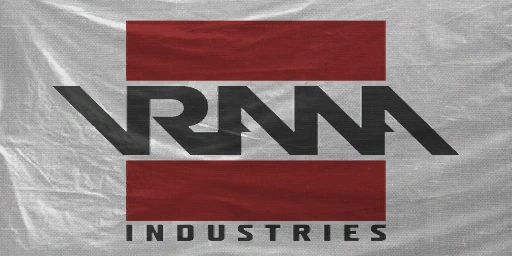VRANA Industries
Executive Summary
VRANA Industries is the world’s leading private military contractor and security consulting firm, with unparalleled influence in global defense markets. As the majority shareholder of ION Services, VRANA controls a vast network of security firms and leads in advanced weapons development and strategic consulting. Their operations span military and civilian sectors, cementing their role as a dominant force in global security. Founded in 1986 by shipping magnate Raymond John St. Pierre, VRANA initially focused on civilian industries. However, the turn of the millennium saw a shift towards military operations, with the acquisition of U.S.-based ION Services PMC (formerly Black Element) marking a pivotal expansion into private military contracting.
Involvement During and After the Kry-Zok Invasion
Kry-Zok Invasion: Tactical and Economic Response
When the Kry-Zok invasion began, VRANA Industries quickly capitalized on the global crisis, becoming one of the primary suppliers of advanced weapons and defense technologies. Their subsidiary, ION Services, was rapidly mobilized, deploying elite mercenary units to reinforce overwhelmed TDA (Terran Defense Authority) forces. In parallel, VRANA's advanced R&D divisions began working on innovative countermeasures specifically designed to combat the Kry-Zok threat, including experimental weaponry and adaptive armor systems tailored to resist Kry-Zok bio-attacks. Behind the scenes, the shadow council saw the Kry-Zok invasion as both a threat and an unprecedented business opportunity. The chaos and fear generated by the invasion drove global demand for VRANA’s services to an all-time high. Governments and resistance factions alike were willing to pay exorbitant fees for protection, security consultations, and exclusive access to VRANA’s cutting-edge technology. This demand allowed VRANA to dramatically increase its profits and expand its influence across the globe.
Post-Invasion: Consolidation of Power and Influence
After the Kry-Zok invasion was contained, VRANA Industries solidified its role as the dominant force in global security. Their involvement in the crisis left them with significant leverage over many of the world’s governments and resistance factions, which had become heavily dependent on VRANA’s resources during the invasion. In the aftermath, VRANA shifted focus to long-term strategies, such as rebuilding and reinforcing global defense infrastructures. They offered reconstruction services, security training, and continued technological innovation, ensuring that their clients remained loyal and dependent on their expertise. VRANA also capitalized on the vacuum of power left by devastated nations, securing strategic contracts that allowed them to effectively control key regions and resources, further embedding themselves into the global power structure.
The Infestation and Ongoing Conflicts: Profiteering and Strategic Maneuvering
The Infestation Outbreak
The global infestation outbreak presented yet another opportunity for VRANA Industries. While the TDA and resistance factions struggled to contain the spread, VRANA positioned itself as the only entity capable of providing effective, large-scale containment solutions. Their scientists and engineers developed advanced biohazard containment units and anti-infestation weaponry, marketed as the last line of defense against the relentless spread of the biohazard. Moreover, VRANA deployed specialized clean-up teams, highly trained mercenaries equipped with the latest anti-infestation gear, to combat the outbreaks directly. These teams were not only effective in containment but also gathered valuable data on the infestation, which VRANA used to enhance their products and maintain their technological edge. This made them indispensable to both TDA and resistance factions, who were willing to pay top dollar for VRANA's services.
The TDA vs. Resistance Conflict: Double-Edged Contracts
In the ongoing war between the TDA and the various resistance factions, VRANA Industries played both sides to maximize profits. While publicly aligned with the TDA as a key contractor, VRANA discreetly provided arms and strategic consultation to resistance factions as well. This duplicitous approach ensured that the conflict remained prolonged and that both sides remained dependent on VRANA’s supplies and expertise. The shadow council saw the sustained conflict as beneficial, keeping the world in a state of controlled chaos where their influence could expand unchecked. VRANA’s ability to play both sides without being exposed was a testament to their covert operations and the secrecy surrounding their true leadership.
Headquarters
VRANA Industries is headquartered in Montreal, Quebec, a city that has transformed into a Bastion City (Sector NA-2) following the end of the Kry-Zok invasion. This transformation has made Montreal a central population hub and a critical strategic center in the post-invasion landscape. The city’s prominence reflects VRANA’s significant role in maintaining regional stability and control.
Conclusion
VRANA Industries stands as an unrivaled force in the global security and defense landscape. With its roots in maritime security and private military contracting, the company has evolved into a multifaceted conglomerate, shaping the world through its vast network of subsidiaries and strategic influence. In the wake of the Kry-Zok invasion, VRANA’s headquarters in Montreal, now a Megacity, symbolizes the company’s enduring power and central role in post-invasion governance. Operating from the shadows, VRANA’s leadership ensures the company’s continued dominance, navigating the complexities of a world marked by conflict, infestation, and geopolitical strife. Whether profiting from war, providing essential security solutions, or subtly guiding global events, VRANA Industries remains a formidable entity whose impact on the world is both profound and enduring. As the world continues to grapple with new challenges, VRANA’s influence is likely to grow, securing its place as a pivotal force in the future of global security.



Comments